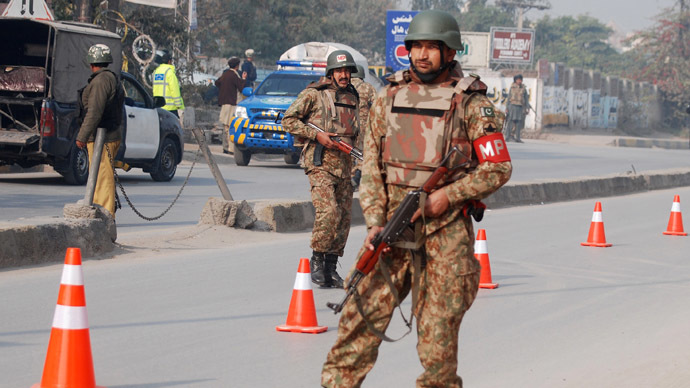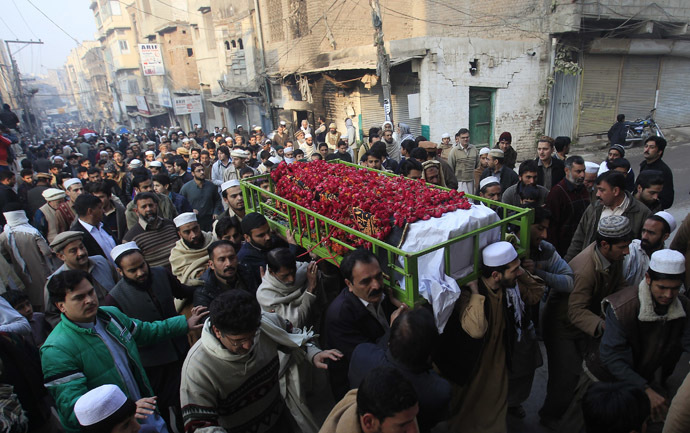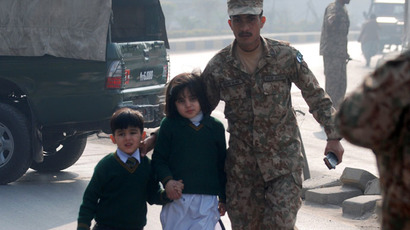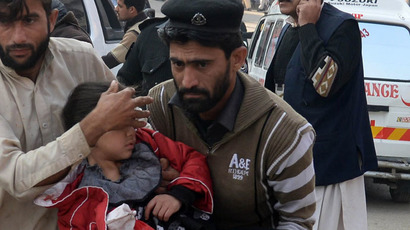Pakistan to ban 12 more terror groups amid ‘paradigm shift’ in security policy

In a move described by experts as “paradigm shift” in its security policy, Pakistan plans to ban 12 terror groups, including notorious Jamaat-ud-Dawa and the Haqqani network, which Islamabad has long been reluctant to clamp down on.
The decision to ban the organizations is to be formally announced in the “coming days,” The Express Tribune reports, citing senior officials.
The news comes soon after the visit of US Secretary of State John Kerry to Islamabad and Washington’s move to declare the fugitive chief of the Tehreek-e-Taliban Pakistan Mullah Fazlullah as a “Specially Designated Global Terrorist.”
Security analysts have described the move as “paradigm shift” in Pakistan’s security policy.
“This shows the civilian and military leadership are serious to choke militants operating from Pakistan’s territory,” the executive director of the Pakistan Institute for Peace Studies, Amir Rana, told The Express Tribune.
With the latest ban, the number of outlawed groups in Pakistan will reach 72.
Initially, the current trend to sweep out branches of terrorist organizations out of Pakistan was triggered by the monstrous Taliban attack on school in Peshawar on December 16 that resulted in deaths of 145 people, more than 130 of whom were children.

The reaction of Islamabad has been prompt and brutal, as authorities put an end to the death penalty moratorium introduced in the country in 2008 and approved a wide-ranging National Action Plan against terrorism.
READ MORE: Pakistan revokes ban on death penalty after Taliban school siege
As soon as the moratorium on capital punishment was lifted, Islamabad said it plans to execute hundreds of captive Islamist militants held in the country’s jails.
READ MORE: Pakistan starts hanging militants in revenge for school massacre
Then Pakistan’s political leaders decided to amend the constitution to form an alternative military court system that will swiftly try alleged terrorists and extremists.
READ MORE: Pakistan amending constitution to set up anti-terror military courts
The authorities in Kabul, New Delhi and Washington will probably welcome the news, since they all have scores to settle with terrorist organizations in the region.
The Jamaat-ud-Dawa (JuD) is the political arm of the Lashkar-e-Taiba terror organization accused of being behind the multiple terror attack on the Indian city of Mumbai in 2008, which left 164 people dead. This terror attack brought the organization to prominence, and the UN and US both sanctioned JuD leaders.
The Afghan-based Haqqani network initially was equally nurtured by the US Central Intelligence Agency (CIA) and Pakistan's Inter-Services Intelligence (ISI) against the Soviet troops in Afghanistan.
After the US-led coalition invaded Afghanistan in 2001, the Haqqani network turned its arms against its former patrons. Among countless attacks on American and Afghan troops over the years of occupation, the organization took responsibility for the 2011 attack on the US embassy in Kabul, as well as the bombing of the Indian embassy in Kabul in 2008, which claimed 58 lives.
US and Afghan officials have repeatedly accused Pakistan’s ISI security agency of covertly backing the Haqqani network – a claim the spy agency consistently denied.
However the US designated Haqqani as a terrorist organization only in September 2012.
READ MORE: Pakistan angered at 'hellhole' depiction in 'Homeland' – report














